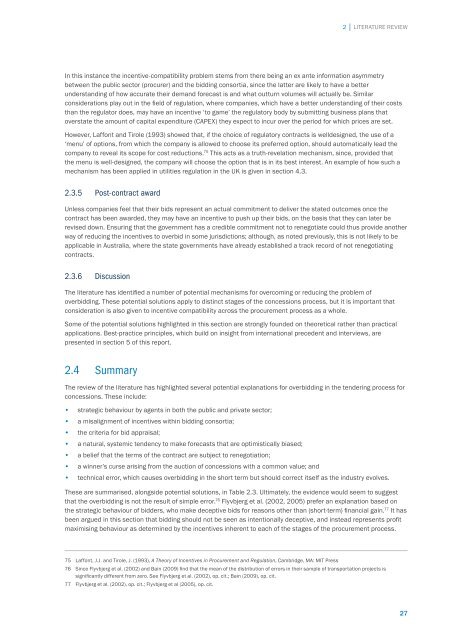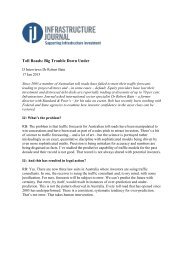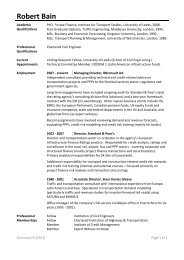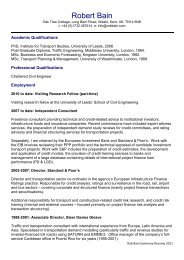Disincentivising overbidding for toll road concessions
Disincentivising overbidding for toll road concessions
Disincentivising overbidding for toll road concessions
- No tags were found...
You also want an ePaper? Increase the reach of your titles
YUMPU automatically turns print PDFs into web optimized ePapers that Google loves.
2 │ LITERATURE REVIEW<br />
In this instance the incentive-compatibility problem stems from there being an ex ante in<strong>for</strong>mation asymmetry<br />
between the public sector (procurer) and the bidding consortia, since the latter are likely to have a better<br />
understanding of how accurate their demand <strong>for</strong>ecast is and what outturn volumes will actually be. Similar<br />
considerations play out in the field of regulation, where companies, which have a better understanding of their costs<br />
than the regulator does, may have an incentive ‘to game’ the regulatory body by submitting business plans that<br />
overstate the amount of capital expenditure (CAPEX) they expect to incur over the period <strong>for</strong> which prices are set.<br />
However, Laffont and Tirole (1993) showed that, if the choice of regulatory contracts is welldesigned, the use of a<br />
‘menu’ of options, from which the company is allowed to choose its preferred option, should automatically lead the<br />
company to reveal its scope <strong>for</strong> cost reductions. 75 This acts as a truth-revelation mechanism, since, provided that<br />
the menu is well-designed, the company will choose the option that is in its best interest. An example of how such a<br />
mechanism has been applied in utilities regulation in the UK is given in section 4.3.<br />
2.3.5 Post-contract award<br />
Unless companies feel that their bids represent an actual commitment to deliver the stated outcomes once the<br />
contract has been awarded, they may have an incentive to push up their bids, on the basis that they can later be<br />
revised down. Ensuring that the government has a credible commitment not to renegotiate could thus provide another<br />
way of reducing the incentives to overbid in some jurisdictions; although, as noted previously, this is not likely to be<br />
applicable in Australia, where the state governments have already established a track record of not renegotiating<br />
contracts.<br />
2.3.6 Discussion<br />
The literature has identified a number of potential mechanisms <strong>for</strong> overcoming or reducing the problem of<br />
<strong>overbidding</strong>. These potential solutions apply to distinct stages of the <strong>concessions</strong> process, but it is important that<br />
consideration is also given to incentive compatibility across the procurement process as a whole.<br />
Some of the potential solutions highlighted in this section are strongly founded on theoretical rather than practical<br />
applications. Best-practice principles, which build on insight from international precedent and interviews, are<br />
presented in section 5 of this report.<br />
2.4 Summary<br />
The review of the literature has highlighted several potential explanations <strong>for</strong> <strong>overbidding</strong> in the tendering process <strong>for</strong><br />
<strong>concessions</strong>. These include:<br />
••<br />
strategic behaviour by agents in both the public and private sector;<br />
••<br />
a misalignment of incentives within bidding consortia;<br />
••<br />
the criteria <strong>for</strong> bid appraisal;<br />
••<br />
a natural, systemic tendency to make <strong>for</strong>ecasts that are optimistically biased;<br />
••<br />
a belief that the terms of the contract are subject to renegotiation;<br />
••<br />
a winner’s curse arising from the auction of <strong>concessions</strong> with a common value; and<br />
••<br />
technical error, which causes <strong>overbidding</strong> in the short term but should correct itself as the industry evolves.<br />
These are summarised, alongside potential solutions, in Table 2.3. Ultimately, the evidence would seem to suggest<br />
that the <strong>overbidding</strong> is not the result of simple error. 76 Flyvbjerg et al. (2002, 2005) prefer an explanation based on<br />
the strategic behaviour of bidders, who make deceptive bids <strong>for</strong> reasons other than (short-term) financial gain. 77 It has<br />
been argued in this section that bidding should not be seen as intentionally deceptive, and instead represents profit<br />
maximising behaviour as determined by the incentives inherent to each of the stages of the procurement process.<br />
75 Laffont, J.J. and Tirole, J. (1993), A Theory of Incentives in Procurement and Regulation, Cambridge, MA: MIT Press<br />
76 Since Flyvbjerg et al. (2002) and Bain (2009) find that the mean of the distribution of errors in their sample of transportation projects is<br />
significantly different from zero. See Flyvbjerg et al. (2002), op. cit.; Bain (2009), op. cit.<br />
77 Flyvbjerg et al. (2002), op. cit.; Flyvbjerg et al (2005), op. cit.<br />
27






